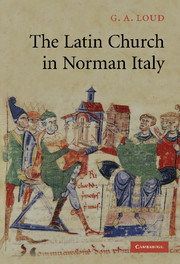Book contents
- Frontmatter
- Contents
- Preface
- List of maps
- List of abbreviations
- Map I Southern Italy: archbishoprics and principal bishoprics
- Map II Southern Italy: abbeys
- Map III The dioceses of Sicily in the late twelfth century
- Map IV The dioceses of the Terra di Bari
- Map V The dioceses of the Terra di Lavoro
- Introduction
- 1 The Church in southern Italy before the Normans
- 2 The Church and the Norman conquest
- 3 The papacy and the rulers of southern Italy
- 4 The papacy and the Church in southern Italy
- 5 The kings of Sicily and the Church
- 6 The Church and military obligation
- 7 The secular Church
- 8 Monasticism
- 9 Latins, Greeks and non-Christians
- Conclusion
- Appendices
- Bibliography
- Index
9 - Latins, Greeks and non-Christians
Published online by Cambridge University Press: 04 May 2010
- Frontmatter
- Contents
- Preface
- List of maps
- List of abbreviations
- Map I Southern Italy: archbishoprics and principal bishoprics
- Map II Southern Italy: abbeys
- Map III The dioceses of Sicily in the late twelfth century
- Map IV The dioceses of the Terra di Bari
- Map V The dioceses of the Terra di Lavoro
- Introduction
- 1 The Church in southern Italy before the Normans
- 2 The Church and the Norman conquest
- 3 The papacy and the rulers of southern Italy
- 4 The papacy and the Church in southern Italy
- 5 The kings of Sicily and the Church
- 6 The Church and military obligation
- 7 The secular Church
- 8 Monasticism
- 9 Latins, Greeks and non-Christians
- Conclusion
- Appendices
- Bibliography
- Index
Summary
Much of the south Italian peninsula had been taken from the Byzantine empire, and Duke Robert and Count Roger conquered the island of Sicily from Islam. These regions had not just been provinces subject to alien powers, but a significant part of the population spoke the language and followed the religion of their rulers. At the end of the twelfth century Peter of Eboli famously described Palermo as ‘endowed with people of three languages’. While in Apulia Greeks were in a majority – and indeed present in any numbers at all – only in the Salento peninsula in the extreme south, at the time of the conquest they had an overwhelming preponderance in Lucania and central and southern Calabria, as well as comprising anything up to a third of the population of Sicily, concentrated especially in the north-east of the island, the Val Demone. In the rest of Sicily there were a few Christians; some Greeks, but probably more Arabic-speakers in everyday life, even if Greek was their liturgical language. But here the Norman conquerors faced the problem of a largely Muslim population, who remained under Christian rule. Some of the Muslim elite emigrated during or immediately after the conquest, but many of the Muslim inhabitants of Sicilian towns and the overwhelming majority of those in the countryside remained. Furthermore, in order to secure the surrender of Muslim towns, the Normans had granted recognition of Islamic law and de facto religious toleration.
- Type
- Chapter
- Information
- The Latin Church in Norman Italy , pp. 494 - 520Publisher: Cambridge University PressPrint publication year: 2007



